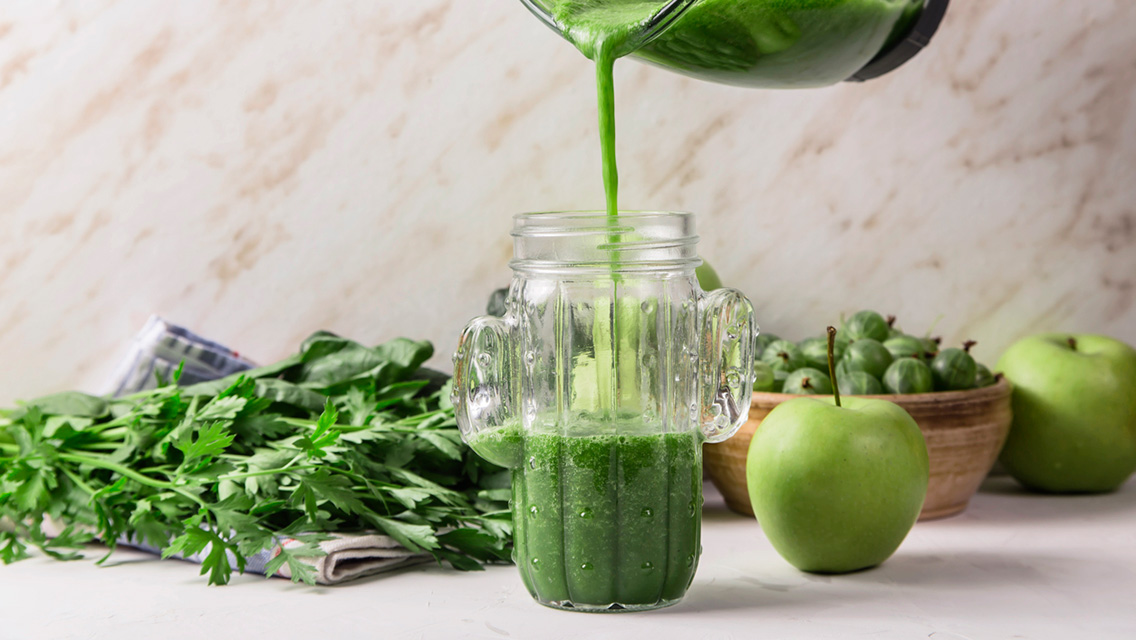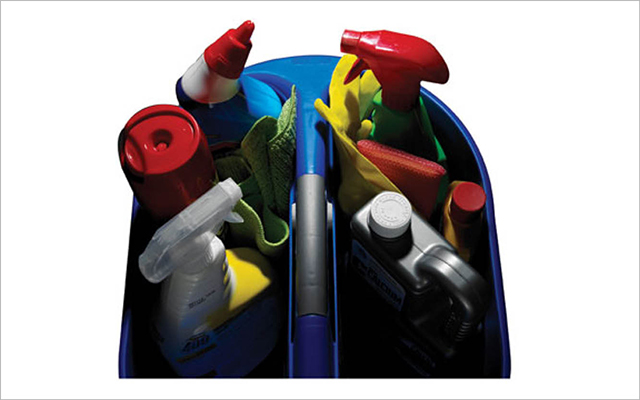Explore the following sections in this article:
Liver Supporting Foods ⋅ Staying Hydrated ⋅ Prevent Heavy Metal Accumulation ⋅ Colon Cleansers ⋅ pH Balancing Foods ⋅ Fermented Foods ⋅ Fight Inflammation ⋅ Support Sweat Production
Lemon-juice flushes. Coffee enemas. Fruit-only diets. With funky programs like these flourishing, it’s no wonder many people dismiss detoxing as a perennial fad.
But don’t be too quick to reject the idea of detoxification altogether. Eating to promote your body’s natural detox functions can help you look and feel better every day — without extreme interventions.
Many of your organs are equipped with detoxification superpowers, and with just a little nutritional support, their powers get stronger. Your liver, for example, neutralizes environmental pollutants that could trigger a range of health conditions. Your kidneys filter waste from your blood. Your skin releases toxic elements via sweat. And the digestive system shuttles waste out of your body with each bowel movement.
So if your body cleanses itself automatically, why worry about detox? Because without some extra help, your body may have a hard time keeping up with whatever life throws its way.
“As modern humans, we’re exposed to an unprecedented array of toxins in our environment,” says Mark Pettus, MD, director of wellness and population health at Berkshire Health Systems in Massachusetts and associate dean of medical education at the University of Massachusetts Medical School.
“As modern humans, we’re exposed to an unprecedented array of toxins in our environment.”
Compounds like glyphosphate in herbicides, phthalates and bisphenol A (BPA) in plastics, and parabens in our cosmetics and pharmaceuticals are among the tens of thousands of chemicals used commercially in the United States. And these compounds affect us negatively at a cellular level.
“The longer these toxins are in contact with our cells, the more likely they are to cause damage to our organs and other bodily systems,” says Robert Rountree, MD, family medicine doctor and faculty member at the Institute for Functional Medicine.
“The longer these toxins are in contact with our cells, the more likely they are to cause damage to our organs and other bodily systems.”
One of the best ways to reduce your toxic load (the chemical burden your body is carrying at any given time) is to eat in ways that optimize your body’s natural detoxification systems and processes.
“It’s better to help the body eliminate toxins at the time of exposure than it is to allow them to accumulate at high levels before going on a radical cleanse,” Rountree says.
“The optimal scenario is to live a detox life as much as possible,” agrees Deanna Minich, PhD, FACN, CNS, author of Whole Detox. “Making some daily, consistent tweaks can have dramatic effects on your long-term health.”
Read on to discover the most detoxifying whole foods, and to learn how they work their magic.
Liver Supporting Foods
Detox Superstars:
- Watercress
- Brussels sprouts
- Kale
- Cabbage
- Broccoli and cauliflower
- Bok choy
- Onions and leeks
- Garlic
Supporting Role:
Compounds found in these foods help to increase the cellular response or sensitivity of enzymes in the liver and remove undesirable elements from your body.
One of the liver’s most important roles is to filter waste products and remove harmful substances from the blood after it passes through the stomach and intestines, and before it moves to the rest of the body.
Think of the liver as an inspection facility, deciding which packages are beneficial and which are not. When the liver finds something toxic, it first separates the dangerous substances from the blood (this is referred to as phase 1 detoxification). The liver’s second step, or phase 2, is to rid your body of the harmful compounds by carrying them away in bile.
Your job is to eat foods that help keep both parts of this two-phase process running efficiently — and that protect the liver from the toxins and byproducts of detoxification.
Good to Know:
Cytochrome P450 enzymes, which are responsible for most phase 1 reactions in the liver, can be stopped in their tracks by a compound found in grapefruit juice. This is why people on cholesterol-lowering statin drugs (whose livers are working overtime) are warned against drinking the beverage. Should a healthy person avoid grapefruit juice? Not necessarily. “Everything we eat can have an effect on our liver enzymes,” says Minich. She advises eating a wide variety of whole foods to help optimize the liver’s detoxification abilities. (See “Fast Track Liver Detox” and “The Everyday Liver Detox” to learn how to keep this organ in optimal shape.)
Staying Hydrated
Detox Superstars:
Supporting Role:
The human body is largely made up of water, so it makes sense that consuming water and water-rich produce helps maintain balance and protects against dehydration. It also helps you detoxify. Fluids allow the kidneys to remove waste products from your blood, sending important minerals back into the bloodstream and flushing the leftover compounds out in your urine.
Good to Know:
Contrary to popular belief, coffee and other caffeinated beverages (consumed in moderation) don’t appear to be dehydrating — though you’ll still want to balance your caffeine habit with plenty of plain water to avoid the jitters and to keep your system flushing regularly. Aim to drink enough fluids and eat enough fresh produce that your urine is light colored. (For more, see “All About Hydration“.)
Keep in mind that our municipal and rural water supplies are contaminated with a wide range of toxins, including pharmaceuticals and pesticides, says Rountree. “Water-treatment plants are designed to get rid of the organisms that will kill you, not the things that will make you sick in the long run,” he says. To minimize your exposure, drink purified or filtered water.
Prevent Heavy Metal Accumulation
Detox Superstars:
Supporting Role:
Heavy metals like lead, mercury, and arsenic are ubiquitous in our environment and are known to cause organ damage and increase cancer risk. Fortunately, some common foods and spices can help prevent their accumulation. (See “Weighing Heavy Metals” to learn more.)
In a 2010 study published in the Journal of Applied Toxicology, rats that had been exposed to mercury were given curcumin, the active compound in the orange-colored spice turmeric. Examining the animals’ kidneys and livers, researchers determined that curcumin significantly reduced the concentration of the heavy metal in these organs and reversed damage done to other bodily systems.
A 2014 study suggests that curcumin may even help prevent liver damage from heavy metals through its ability to bind with metal compounds, potentially helping remove them from the body.
Alginates — carbohydrates found in seaweed — are able to stick to heavy metals like lead and mercury and direct them out of the body through normal excretory processes. Seaweed compounds can also bind to and remove radioactive strontium (a cancer-causing compound) from the body, according to research from Montreal’s McGill University.
Good to Know:
Purchase seaweed from a reputable source that monitors the waters it’s grown in to be sure it’s not contaminated with heavy metals itself, says Rountree.
“Any high-quality seaweed supplier should be able to provide information about the quality of their products on request,” he says, noting that he typically recommends buying seaweed “harvested from areas that are known to be pristine, such as Iceland.”
Colon Cleansers
Detox Superstars:
- Lentils
- Raspberries
- Brown rice
- Barley
- Oatmeal
- Artichokes
- Apples
Supporting Role:
Constipation is one sign that your body isn’t detoxing the way it should. Getting plenty of fiber and water (which is drawn to the soluble fiber in foods like beans and oats, forming a gut-scrubbing gel) supports healthy, regular bowel movements — helping to remove waste products and other undesirable compounds from your body. “If you’re not moving things through your bowels, then you can’t get rid of that total toxic load,” says Rountree.
Both soluble and insoluble fiber play important roles: In addition to keeping the gut regular, eating a variety of fiber helps provide microbes in the gut with fuel, which helps decrease inflammation and improve immunity. (For more, check out “Fiber: An Important Breast-Cancer Fighter“.)
Good to Know:
All-juice cleanses are devoid of insoluble fiber, so they don’t optimally support your body’s detox-elimination processes, according to Seattle-based nutritionist Riana Giusti, MS, CN. “Fiber helps remove toxic substances that can accumulate in the colon and is an integral part of our bodies’ inherent and natural detoxification systems,” she says.
pH Balancing Foods
Detox Superstars:
- Vegetables
- Citrus fruit
Supporting Role:
The pH balance in the body varies greatly by body part and region. The stomach, for example, is highly acidic, while the layer just outside the stomach lining is quite alkaline to prevent damage to the mucosa. And while the body is generally good at keeping itself balanced, research has shown that a diet heavy in animal proteins but low in non-starchy vegetables and fruits can shift the pH of urine (which may reflect other imbalances in the body) to a more acidic makeup.
“Many enzymes that play a role in detoxification are pH-dependent,” says Minich, which is why you want to maintain balance with a focus on green, leafy, and fresh foods. A diet that focuses on vegetables, fruits, and plant proteins is likely to have an alkalizing effect. When you eat loads of acid-forming foods — like meat, dairy, sugar, and processed carbohydrates — the body neutralizes pH with alkalizing minerals. And if there aren’t enough minerals in your diet, your body pulls them from your bones. (For more on the body’s delicate acid–alkaline balance, see “The pH Factor“.)
Bottom line: Eating more plants will help you maintain healthy biochemistry and bone mass while also setting the stage for proper detoxification.
Good to Know:
It may seem counterintuitive, but acidic fruits like oranges and lemons actually increase the pH of your body, making it more alkaline, says Rountree. The pH of the foods you eat or drink doesn’t directly affect the pH in your bloodstream, thanks to the acid-balancing act described above.
Fermented Foods
Detox Superstars:
- Yogurt
- Kefir
- Tempeh
- Sauerkraut
- Kimchi
Supporting Role:
Keeping the gut healthy is central to overall health, and the probiotic bacteria found in these foods help balance the gastrointestinal tract. “A well-balanced gut microbiome has a wealth of friendly bacteria to keep harmful microorganisms in check,” says Giusti. She adds that a healthy microbial ecosystem also aids in digestion and nutrient generation, metabolism, and absorption; reduces bloating; normalizes bowel movements; and boosts immune function.
Good bacteria may also have the ability to bind to toxins in food and water, such as those from heavy metals. When pregnant women in pollution-fraught Tanzania regularly ate probiotic yogurt during their second and/or third trimesters, they reduced their absorption of mercury by up to 36 percent and arsenic by as much as 78 percent, according to 2014 research from Canada’s Lawson Health Research Institute. (For more on probiotics, visit “Discover Fermented Foods“.)
Good to Know:
The refrigerated section of the supermarket is your best source for probiotic-rich foods — not just yogurt and kefir, but also sauerkraut and pickled vegetables. “Products that are shelf stable have undergone pasteurization and canning processes that will heat the product and kill the beneficial bacteria,” says Giusti.
Fight Inflammation
Detox Superstars:
Supporting Role:
Foods high in omega-3 fatty acids support your body’s detox efforts on two levels. First, they help keep systemic inflammation in check. Your immune system is adept at fighting off invaders by creating inflammation in the body; chronic inflammation, however — often driven by diets heavy in refined carbohydrates, highly processed meats, and sweets — kicks off reactions that create oxidative stress in the body. This leads to the production of free radicals, unstable compounds that can start a chain reaction and cause cellular damage that contributes to diseases such as cancer and Alzheimer’s.
“When we have oxidative stress in the body, we have more free radicals,” says Minich. “That’s one more thing to detoxify, and that adds stress to the detoxification process.”
Reducing intake of omega-6 fatty acids (present in most commercial meats and processed foods) while increasing omega-3s is crucial to decreasing this “silent inflammation” that underlies chronic disease and leads to a runaway train of free radicals.
Omega-3s may also target toxins directly. According to University of Kentucky researchers, these fats prevent damage to the circulatory system caused by polychlorinated biphenyls (PCBs), manmade chemicals once used widely in commercial and industrial applications, and still found in the environment despite being banned in 1979.
Good to Know:
The form of omega-3 found in fish is the most effective; plant-based omega-3s found in walnuts and flaxseeds get converted in our bodies to the more powerful form, albeit in smaller amounts and at a relatively slow rate.
Support Sweat Production
Detox Superstars:
- Habanero peppers, serrano peppers, and jalapeño peppers
- Organic green tea and organic black tea
- Organic coffee
Supporting Role:
The skin is your body’s largest organ, providing a barrier that keeps most foreign substances out. It’s also a surface through which some toxins can be excreted via your sweat. Certain foods can encourage perspiration and nudge your sweat glands to cleanse away. In a review of 24 studies published in the Journal of Environmental and Public Health, researchers concluded that sweating has the potential to assist with removing toxins, such as heavy metals, from the body.
“The capsaicin in hot peppers creates a heated, metabolically revved response,” says Minich. Caffeine, she says, is also warming to the body — it stimulates certain liver enzymes.
Good to Know:
Taking saunas and working up a sweat at the gym are good ways to support a detox-promoting lifestyle.
If You Need More Detox Support
An everyday approach to detox can help you maintain good health and prepare you for a more in-depth cleanse when you need it.
“If you’re eating a lot of detox-supporting foods but still suffering from fatigue, decreased cognition, or loss of memory, as well as gastrointestinal issues like bloating, or neurologic symptoms like tremors that doctors haven’t been able to get to the bottom of, you might need a more targeted detoxification program,” says Deanna Minich, PhD, FACN, CNS, author of Whole Detox.
Ancestry can also be a factor: Genetics influence whether you’re inclined to have certain impaired detox capacities.
Gene testing is becoming more widespread, says Minich. A functional-medicine practitioner or doctor specializing in personalized medicine can help you find a targeted approach that might include supplements like n-acetyl cysteine (NAC) and other foods to build glutathione levels. (For more, see “8 Ways to Boost Glutathion“.)






This Post Has 0 Comments